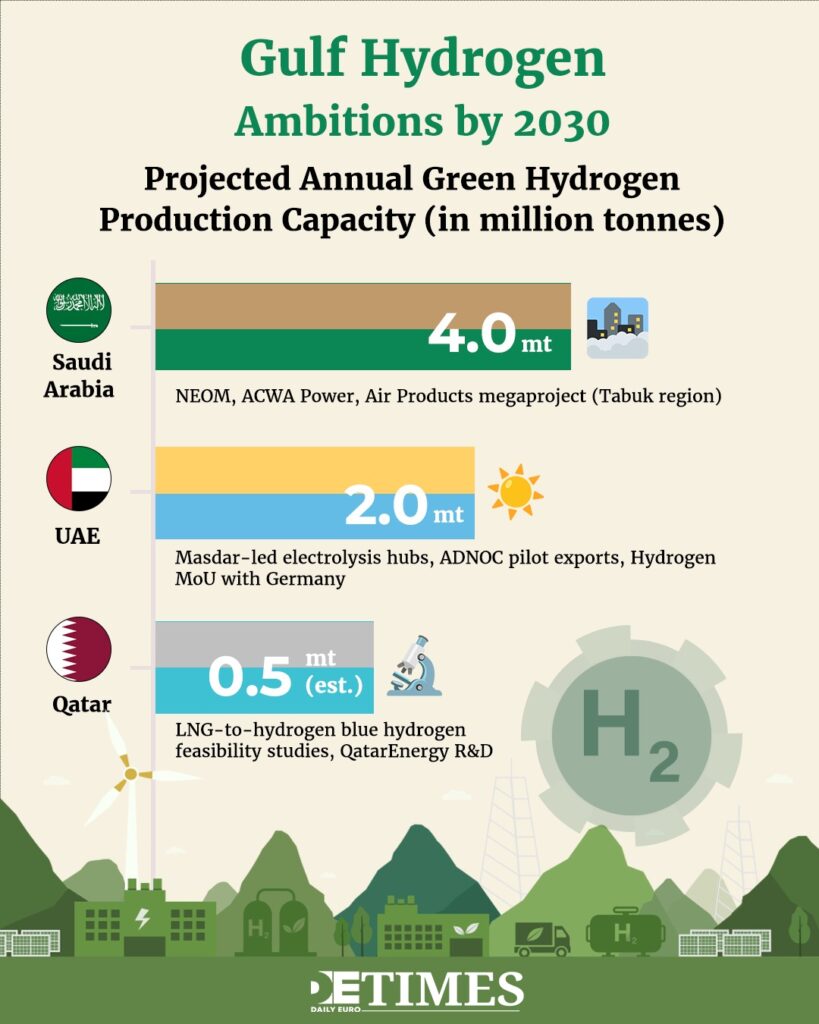Germany’s energy policy has undergone a significant turn in recent years, with the country tying it’s green revolution to a strategic rethink of its international partnerships. Particular attention has been drawn to the Gulf states with their plans to produce green hydrogen at mass.
All three states are viewed as key energy suppliers and potential allies in the development of hydrogen energy: one of the most promising sources of clean energy for the future.
German leaders have visited the region on numerous occasions, strengthening bilateral ties and promoting the idea of “hydrogen diplomacy.”
Germany’s Energy Shift: From Coal to Hydrogen
For Germany, traditionally focused on coal and natural gas, the transition to renewable energy is a matter of economic security and therefore national security.
In 2022, the Ukraine war forced Berlin to look for new and reliable energy sources signing a MoU with the UAE's Masdar: German firms Uniper and RWE signed economic partnerships with Masdar.
Hydrogen is a universal energy source that attracts the attention of politicians and businesses because of it’s environmental advantages. Unlike hydrocarbons, water is the sole product of any combustion of hydrogen, making it attractive for reducing CO₂ emissions in industry, transport, and energy.
Germany has announced large-scale investments in the production of “green” hydrogen otherwise termed as hydrogen produced using electricity from renewable sources.
However, hydrogen production in Germany is still limited: German energy infrastructure does not match energy demand. Berlin is therefore eyeing new partnerships to cover it’s energy needs whilst being carbon neutral.
The Persian Gulf: A New Centre of the Hydrogen Economy?
Similarly, the Gulf states are actively seeking new energy resources that deliver non-finite energy which is also green.
The region has all the conditions for hydrogen production: extensive solar energy, offshore wind potential, high tech supply-side capital, and a surplus of financial capital to fund macro-scale projects.
For example, the UAE and Saudi Arabia are already implementing large-scale projects for the production of “green” hydrogen, aimed at European and Asian export markets. Riyadh plans to build the world’s largest hydrogen production plant as part of the NEOM project: a large-scale futuristic city focused on green production and high technology.
For Germany, such partnerships are an opportunity not only to provide itself with reliable and environmentally friendly fuel, but also to strengthen its position in the global fight against climate change.

German Leaders Visit the Region: Strengthened Hydrogen Ties
Visits by high-ranking German politicians to the Gulf countries have become regular affairs following the Ukraine war.
In January 2023, German Chancellor Olaf Scholz paid an official visit to the UAE and Saudi Arabia.
During the talks, special attention was paid to energy cooperation and hydrogen diplomacy. Germany and the UAE signed a memorandum of understanding on hydrogen energy, envisaging joint projects and technology exchange.
In March 2024, German Economy Minister Robert Habeck also visited the region to discuss the possibility of expanding hydrogen imports and infrastructure investments. Such visits indicate that Germany sees the Gulf region as an economy of raw materials and partner in the production and supply of green energy.
Europe is therefore a key tech and energy partner in the coming decades.
Hydrogen Diplomacy
Hydrogen diplomacy alongside the Gulf allows Germany to diversify its energy sources, increase energy security, whilst neutralising it’s carbon emissions.
In return, Abu Dhabi’s use of Masdar in and outside of Europe locks in the UAE’s energy portfolio securing long-term investments in the non-oil economy.
Prospects and Challenges
Implementation, however, faces numerous problems.
Problems include the cost of producing green hydrogen, investment in supply-side capacity, and geopolitical risks.
However, Germany is already allocating significant funds towards the development of technology and infrastructure, including partnerships with GCC states. European integration is also becoming an important element: Germany is developing a common hydrogen market strategy together with other EU countries.
The Gulf region, in turn, is interested in technological exchange that will position the GCC as a key supplier of hydrogen.
Hydrogen diplomacy between Germany and the Gulf countries is a clear example of how energy interests are shaping new international alliances.
The prospects for hydrogen cooperation promise not only an energy transformation, but a political lynchpin between Europe and the GCC with enormous ramifications for Europe’s energy security, carbon neutral future, and the Gulf’s emerging new edge as a supplier of green tech.
Read the Latest Articles on DET!
Confessions and Invisible Tragedies: Why Cheating is More Popular than Death
A New Wave of Bioethics: The Frontiers of Genetic Engineering
Malta Shuts the Door on ‘Golden Passports’: Contribution, Not Direct Investment





